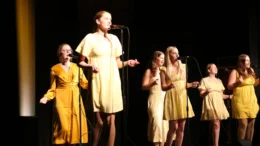Slippery Rock University has retrofitted the old Har-Mer Elementary building in Harrisville with a state-of-the-art graduate study facility designed to educate and train students seeking a master’s degree in the university’s physician’s assistant program.
A physician’s assistant shares many of the same responsibilities a medical doctor does, although they usually need to operate under the supervision of a doctor. They can assist a doctor in a surgery but can not perform surgery themselves.
Locations can affect the differences between a physician’s assistant and a licensed doctor as well.
In some states, a physician’s assistant is legally allowed to write prescriptions. In Pennsylvania, with a doctor’s approval, a physician’s assistant may legally prescribe medication.
The university’s newly renovated building is led by program director Dr. Scott Massey and focuses on creating a learning environment where students will also have the ability to gain real-world experience.
Har-Mer’s school was closed in 2013 due to declining enrollment and shortly after the Slippery Rock area superintendent offered the building to the university. Administrators and officials from the university took a tour of the property.
The university purchased the property last February with the intent of instituting a new physician’s assistant program on the premises.
“We all could see that it had huge potential,” Massey said.
“The university put a lot of work and effort and money into retrofitting this,” he said. “They’re still kind of doing some fine tuning but they finished up the project about a week or a week and a half before the students arrived.”
Classes began May 12 with 52 students accepted into the first incarnation of the program.
Massey said the class size is actually bigger than the average physician’s assistant program nationwide and is quite a bit larger than most new programs, which usually only serve roughly 30 students.
He stressed that the degree is in high demand and that of 21,000 applications nationwide, only about 8,000 are accepted.
Roughly two-thirds of the building has been retrofitted in the process, with the rest tentatively dedicated to an occupational therapy program.
The newly refurbished building features state-of-the-art technology designed to prepare and educate the program’s graduate students as they prepare for their careers. It features traditional classrooms for lectures, clinical laboratories, simulation rooms, and a clinical skills lab where advisors are able to watch and interact with students treating patients with high-tech observational equipment.
The lab features independently-operated cameras in each room, all of which provide feedback to the control room.
Every camera can be moved, rotated and zoomed independently of one another and observers are able to advise students in real-time through microphones in the ceiling.
Video can then be stored on a stack of hard-drives in the far corner of the room, where students and professors will be able to go back and analyze their patient care.
The 24-month program will encompass two different classes. The first-year students will spend their times in the classroom, as well as shadowing professionals and going through clinicals. The second-year students have a more hands-off approach.
“The second year, they’re not really shadowing they’re actually doing,” Massey said. “They’re seeing patients, they’re assessing them.”
One of the simulation rooms features a $150,000 dummy that provides realistic patient situations.
The Sim-Man3G is a mannequin that accurately mimics real-life patient situations, all the while providing feedback to the student and instructors working on the dummy.
Also in the building are what Massey called “Classatories” that function as a hybrid of a clinical and a classroom. Rows of miniaturized doctor offices line each side of the wall so students can diagnose and treat real patients while learning from professors.
Massey has been the director of four different programs.
“I’ve never had a facility this good before, this is the best I’ve had,” Massey said.
With any new establishment coming into town, changes are bound to happen.
Harrisville mayor Gary Hughes is optimistic that the influx of college students and rentals will be a good thing.
“It’s going to be something that helps put Harrisville on the map, I think,” he said. “I got to tour the building and it’s out of this world.”
Hughes thought it was “fantastic” what the university had managed to achieve working in the confines of the old elementary school.
“It’s a great thing in many ways. It’s a great thing for Pennsylvania for the students from the state to have a program available,” Massey said, “PA (physician assistant) programs are very expensive, but this is a relatively economic way for students to become PAs. The program will be very high quality, we had a very high quality applicant pool.”
While some may have a pessimistic view of college students moving into an area, Massey thinks it will have a positive effect on the community.
“I just think that it’s going to change the flavor of the community,” he said. “When you infuse students and eventually get some who live in the community, I think it will be positive.”
Massey says Slippery Rock president Cheryl Norton wants to host an open house but that there is no concrete date yet for when that will happen.





































